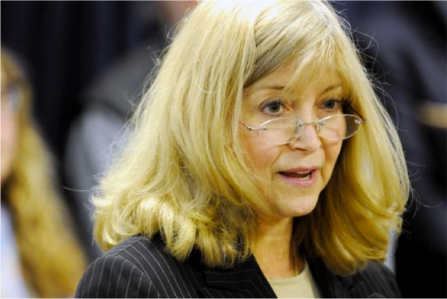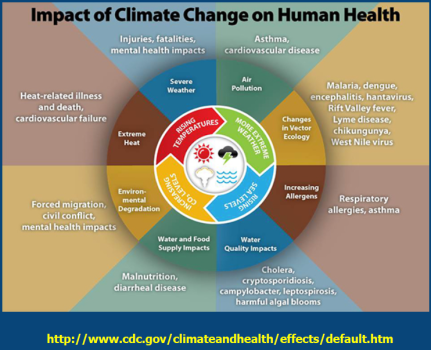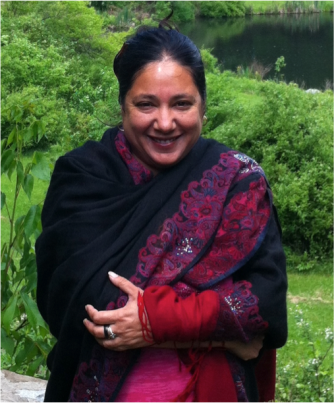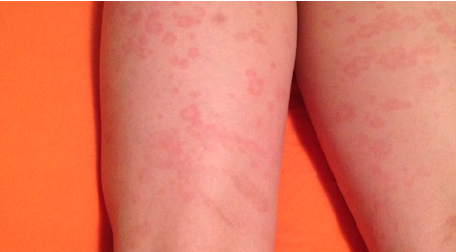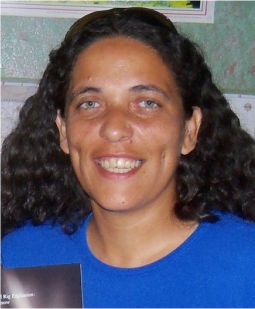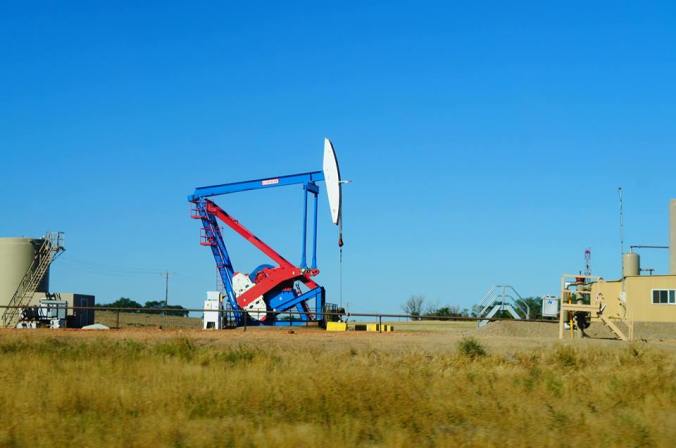
Fracking fields near agricultural land on the Fort Berthold Reservation, North Dakota, USA – Photo by Emily Arasim
Compiled by Emily Arasim, WECAN Communications Coordinator
On March 16, diverse women for climate justice united for the first session of the 2016 series of online U.S Women’s Climate Justice Initiative Education and Advocacy trainings presented by the Women’s Earth and Climate Action Network (WECAN International).
‘Health and Climate Change: What Is At Stake, What Can Be Done?’ featured four outstanding women leaders discussing the latest science and news on the climate change and health impacts that are effecting everyone; stories and solutions from frontline and Indigenous communities exposed to toxic pollution; and tools and strategies for engaging in education, advocacy, and direct action campaigns around health and climate issues in local communities, and at the national and international level.
Osprey Orielle Lake, Executive Director of WECAN International, opened the training will comments on the vital nature of women as climate leaders, and spoke to the training goal of building and empowering a strong constituency of women in the US taking bold action on climate change.
Osprey pointed to education, advocacy and action around matters of community, children and familial health as a powerful window through which we can demonstrate the reality, urgency and injustice of the climate crisis, and thus catalyze meaningful action from concerned allies across the globe.
Dr. Sylvia Hood Washington took the floor as the first speaker of the day. Dr. Hood Washington is an interdisciplinary scholar, project engineer and environmental health scientist with over 25 years of experience working with grassroots activists concerned with environmental and health inequalities tied to industrial operations.
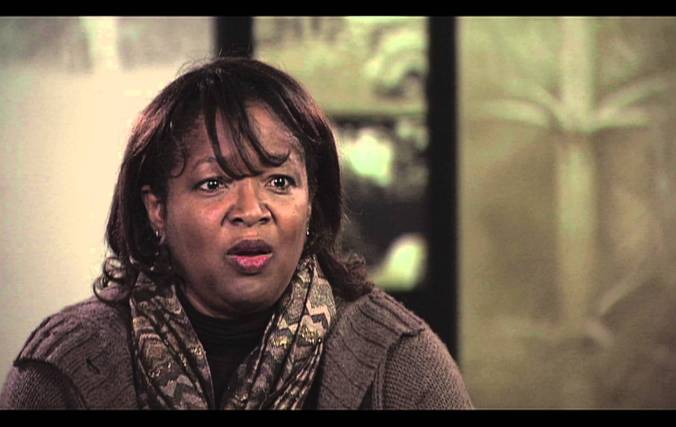
Dr. Sylvia Hood Washington
Her vital work has included time directing a project which utilized the oral history of black Catholics in Chicago and the input of physicians, engineers and theologians to develop relevant environmental literacy and educational material promoting environmental justice among marginalized urban communities, as well as work as the Principle Investigator for a grant developing and utilizing GIS models to examine environmental health disparities tied to sewage infrastructures in the Great Lakes region. Currently, she serves as Co-Advisor on the Environmental Justice Advisory Board of the Illinois Environmental Protection Agency, and as Editor in Chief of the Environmental Justice Journal.
Dr. Hood Washington provided an overview of the climate impacts effecting global communities and residents of Illinois communities, with a focus on asthma, particulate matter and pollutants, and heat waves and heat related illnesses.
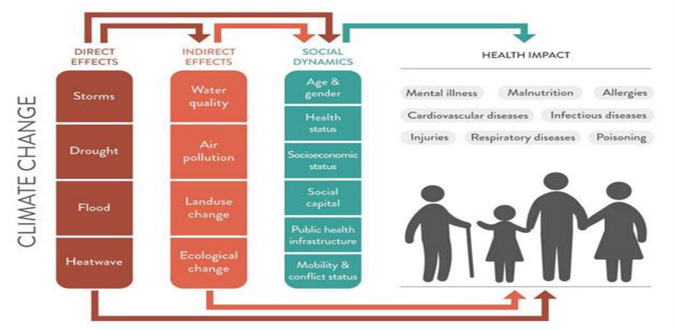
In her reflections, Dr. Hood Washington commented upon her time working during COP21 climate negotiations in Paris in December 2015, drawing attention to the important movement she witnessed being built around people uniting to listen to and respond to the poignant frontline stories of those who are experiencing the human and health impacts of a changing climate on a daily basis.
Through her presentation and the question and answer session, she also helped navigate issues of environmental racism, discussing connections between economic inequality and severity of exposure to pollution and other climate impacts.
“Who is bearing the costs of our lifestyle?”, she questioned, prompting participants to reflect on the double violence faced by many low income, immigrant, black and Indigenous communities across the US and the world, who experience the frontline impacts of pollution and extraction sources near their homes, as well as the effects of inadequate services, infrastructure and support during times of climate disaster and stress.
In her closing remarks, Dr. Hood Washington drew attention to the US Clean Power Plan as an important tool with which we must all engage to push for government action and environmental and social justice for all.
Cherri Foytlin, freelance journalist/photographer, speaker, artist, activist and mother of six living in south Louisiana, spoke next.
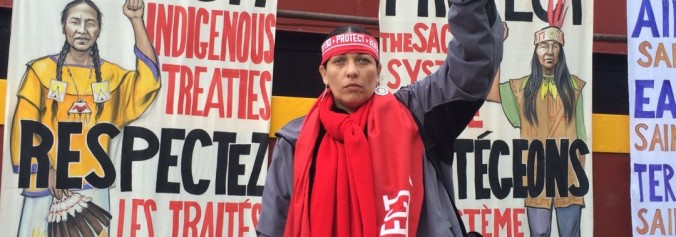
Cherri Foytlin pictured at a direct action during the United Nations COP21 climate negotiations in Paris, France – Photo by Emily Arasim
Cherri is of Dine, African-American and Latina descent, and has been a leading voice for the health and ecosystems of Gulf Coast, and for global climate justice and solutions, leading and participating in thousands of international, national and local forums, events, protests and direct actions, including a 2011 walk to Washington D.C. from New Orleans (1,243 miles) to call for action to stop the BP drilling disaster. Cherri is a founding member of the Gulf Coast Chapter of The Mother’s Project – Mother’s for Sustainable Energy and Idle No More Gulf Coast, and has recently taken on a position as State Director with Bold Louisiana. She is the author of ‘Spill It! The Truth about the Deep Water Horizon Oil Rig Explosion’, and a regular contributor to http://www.BridgetheGulfProject.org, the Huffington Post, and other publications.
Her powerful presentation focused on climate and health impacts in the Gulf Coast region, where hundreds of acres of land are sinking into the ocean due to rising seas, climate and extreme weather disasters, and fossil fuel infrastructure which cuts channels into the regions critical wetlands and other fragile living systems.
As a result of years of toxic industry and environmental destruction, south Louisiana has one of the highest cancer rates in the United States. Cherri spoke to the dire health effects being felt amongst costal communities in the wake of the BP Gulf oil spill, including cancer, neurological disease, skin problems and respiratory issues that are a result of both the initial spill, and the toxic dispersants sprayed in the aftermath (see video resource – The Rising: Connecting Human Health and Oil Operations).
In addition to the damages done by the BP spill and the many industrial sites strewn across the Gulf region, she also drew attention to the growing effects of insect borne diseases, including zikia and other tropical virus once rare, but now appearing throughout changing ecosystems of the US.
Cherri presented critical information about unfolding plans to lease an additional 43 million acres of Gulf waters for oil drilling this year, followed by another 47 million in 2017 – all despite the clear and devastating human and environmental impacts, and the regions growing vulnerability to severe storms and climate disasters.
Cherri ended her presentation discussing the critical No New Leases campaign being led to block offshore drilling leasing plans in the Gulf, and a successful recent community organizing campaign led to remove a fracking well built next to her sons school.
She discussed the goals of the local community and Earth protection movement, which parallel the growing global call to #KeepItInTheGround, with action aiming to end all new oil leases and build a just renewable energy transition with powered by energy coops and a new economy industry by and for the people.
“This is not about if we can win, it is about when we win, because at a certain point the scale will tip. And I think it already has in some ways – they cannot deny us clean air, they can no longer deny us clean water – and they sure can’t deny our babies a clean future, especially as they rise to defend it themselves,” Cherri concluded, handing the floor to fellow presenter Pramilla Malick.
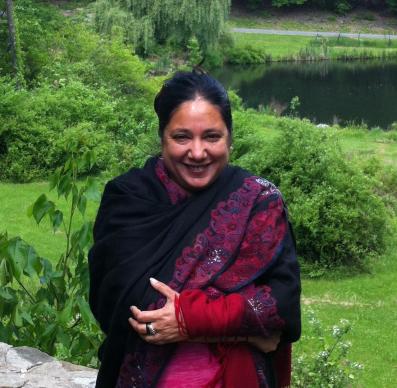
Pramilla Malick
Pramilla Malick represents Protect Orange County and is the founder of Stop the Minisink Compressor Station. She is a journalist, blogger, mother, and grassroots community organizer working ceaselessly to expose and prevent the damages caused by the expansion of fracking and gas infrastructure in her community in upstate New York.
Through her presentation, Pramilla shared her towns experience and her work, demonstrating the vital role that each one of us can play in exposing and working to transform the social and environmental violations happening across our communities.
Four years ago, Pramilla’s upstate New York community was targeted for construction of a gas compressor station, part of a massive chain of infrastructure needed to extract and transport natural gas, much of which is now coming from hydraulic fracking.
“We realized our community was standing on the precipice of a local health and climate change emergency,” Pramilla recalled, explaining that compressor stations, needed every 40 to 100 miles along a gas pipeline, are a source of many dangerous volatile organic compounds, nitrogen oxide, and methane emissions.
Compelled to action by the dangers facing her town, Pramilla began an ongoing campaign documenting the health impacts being felt by families around the compressor and metering stations, including rashes, nosebleeds, headaches and other signs of more serious long term physical and neurologic damage which have led many of those residents who are able to abandon their homes and move.
She emphasized that all communities across the US should be vigilant and ready to act to prevent construction and/or document violations stemming from similar infrastructure, being proposed in many states as a ‘bridge fuel’ away from coal.
“We are supposed to be on a path to a just transition, but instead governments are trying to embrace these false solutions,” she explained, framing the continued expansion of fracked gas as a violation of our human rights, right to clean air and water, and the rights of future generations to a livable future.
Perry Sheffield, Environmental Pediatrician, Public Health professional and assistant professor in the departments of pediatrics and preventive medicine at the Mount Sinai School of Medicine in New York, spoke next.
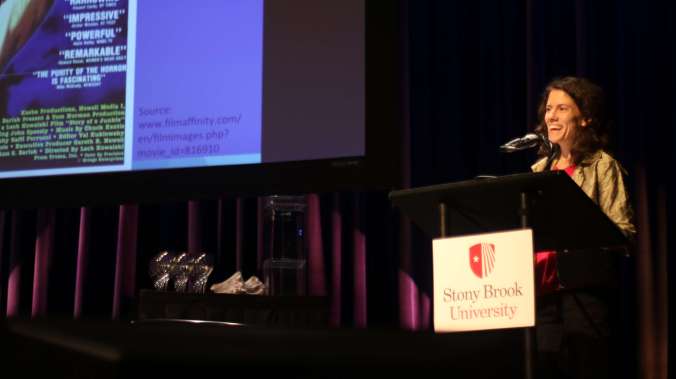
Dr. Perry Sheffield presents on fossil fuels and children’s environmental health. Photo source.
Dr. Sheffield is Deputy Director of the EPA Region II Pediatric Environmental Health Specialty Unit and Lead Investigator for the Queens Vanguard Center of the National Children’s Study. She conducts diverse research on the health impacts of climate change and public understanding of these issues with a particular focus on children. Her publications include, ‘Emerging roles of health care providers to mitigate global warming impacts: A perspective from East Harlem, New York’, and ‘Modeling of Regional Climate Change Effects on Ground-Level Ozone and Childhood Asthma’.
Dr. Sheffield’s presentation focused on children’s health and climate change, providing a harrowing look into the impacts being felt by developing babies, infants and young children, who beginning in the womb, are faced with a host of challenges amplified by intensifying pollution and environmental degradation.
According to Dr.Sheffield, apart from injuries, the principal causes of illness, hospitalization and death among children in America today are asthma, cancer, neuro-developmental disabilities, obesity and diabetes, and birth defects – all conditions related to industrial toxins and the condition of our climate, food and water systems.
Dr. Sheffield drew attention to climate-health impacts including those from increased extreme weather events, wildfire, decreased air quality, worsened allergies, threats to mental health, declines in nutrition and food quality, and illnesses transmitted by food, water, and disease-carriers such as mosquitoes and ticks.
She also shared some of the strides made in protecting children’s health and the integrity of our living Earth – including incredible drops in levels of lead exposure, decreased air pollution in many major US towns and cities, and growing education and advocacy around impacts on children, and the dire need for action to revitalize healthy food access, active lifestyles, and clean energy systems.
For more detailed information on this topic, please see our two-part ‘Health and Climate Change’ 2015 blog series:
- For Our Children & All Generations: Health & Climate Change Training Recap Day One
- Health & Climate: Changing the Narrative – Training Recap Day Two
Training Resources:
- Sylvia Hood Washington PowerPoint
- Cherri Foytlin WECAN PowerPoint
- Pramilla Malick WECAN PowerPoint
- Perry Sheffield WECAN PowerPoint
- American Public Health Association
- National Institute for Environmental Health Sciences
- Environmental Justice Journal
- Our Children’s Trust
- No New Leases – New Orleans, USA action page
- WATCH – The Rising: Connecting Human Health and Oil Operations
- Bridge the Gulf Project: Voices from the Gulf Coast
- Science and Environmental Health Network
- Global Climate Change and Human Health: From Science to Practice by Luber and Lemery eds
Learn more and join future U.S Women’s Climate Justice Initiative online Education and Advocacy trainings: wecaninternational.org/pages/us-climate-initiative

